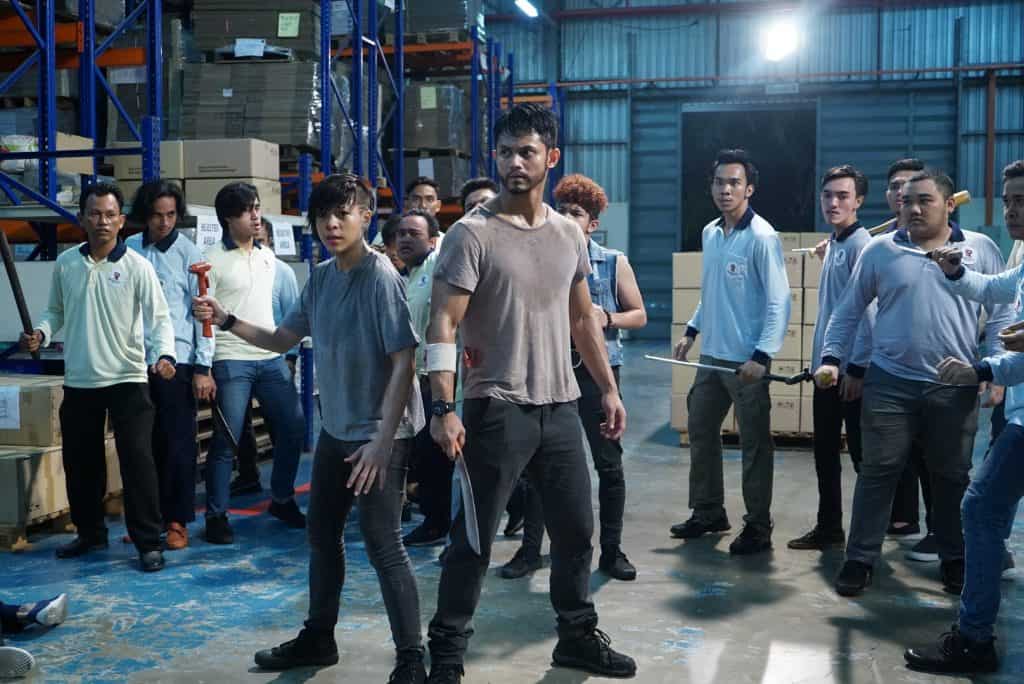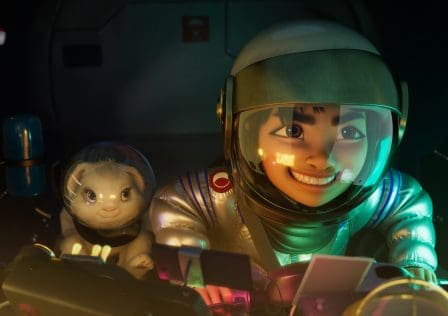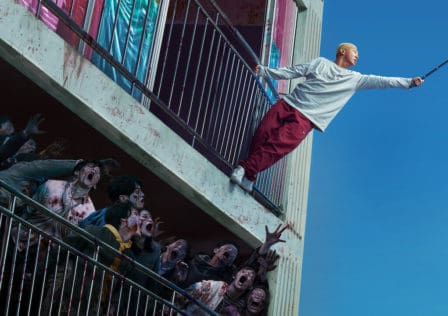Wira will likely entertain you. Good action scenes inevitably do, and Wira has a busload of it – including one set on a bus, which is tense, chaotic, and an accurate representation of peak hour public transportation in Malaysia.
Credit goes to director Adrian Teh and his dedicated cast and crew, which includes Indonesian martial arts star Yayan Ruhian (best known as Mad Dog in The Raid: Redemption), who provided the action choreography. The cast trained for months, and since the actors all performed their own fights, Teh was able to shoot without resorting to cheap tricks like quick cuts or nauseating shaky cam.
There’s a dynamism to Teh’s action shots. The camera bobs and weaves to the action, and there are some inspiring sequences. One features a drone shot that actively tracks a group of assailants entering an apartment block before rising upwards to catch our heroes fighting them off. Good stuff.
Tango has changed a lot these days
Not all of the action scenes are exceptional – one particular sequence, meant to be a single-take fight with dozens of gangsters, comes off as stilted and rather under-choreographed, lacking the grandness of Tom Yum Goong’s restaurant raid or the visceral rawness of Daredevil’s corridor brawl.
But the rest are satisfying, sometimes even exhilarating, which is a feat for a cast that are not professional martial artists like Tony Jaa and Iko Uwais. Wira is fundamentally an old-school martial arts movie – of muscle-bound heroes beating up sleazy thugs, sparking mini revolutions along the way. I’m reminded of Bruce Lee’s The Big Boss, or 2004’s Walking Tall (featuring fresh-out-of-wrestling Dwayne Johnson). Some days it’s just cathartic to watch violent resolutions to violent problems. For that, Wira delivers.
For that, Wira is also incredibly frustrating.
Action movies tend to face a particular dilemma: does it want to be complex, or does it want to be simple? There are good examples of both. The Matrix, I would say, is a complex film and a fantastic action movie. On the contrary, The Raid: Redemption is remarkably simple, sparing the bare minimum of time to establish characters and conflict before thrusting its audience into the action.
These kinds of action
Hitting the sweet spot can be difficult. Bad action sequences look worse if the movie doesn’t offer much by way of plot or themes. At the same time, overly complex films can be so caught up in self-importance that it gets in the way of the action.
Wira fails to hit that sweet spot. It’s not a simple action movie – at the very least, it certainly tries to avoid the dreaded Dumb Movie label people would inexplicably attach to action flicks. Yet, strangely enough, it’s the odd movie that would’ve benefitted by keeping things simple.
The premise certainly isn’t complex. Hassan (Hairul Azreen) is an ex-military officer who retires early and returns to his hometown apartment block, a decrepit place that is under the thumb of a despotic thug called Raja (Dain Said), who fronts a drug smuggling operation and illegal fighting club with his condom business. Hassan is back to convince his father Munas (Hilal Azman) and sister Zain (Fify Azmi) to leave the corrupt town, but complicating matters is his father’s ego and the matter of Zain’s financial debt to Raja. Negotiations ensue, most times with fists.
There’s likely no wifi here, because no authoritarian will ever allow it
At its core, Wira is an anti-authoritarian narrative. Raja and his crime empire not-so-subtly stands in as a metaphor of British colonists, what with his condom factory (rubber and people being the resource he exploits) and the rhetoric “good” he brings to the apartment’s residence through job opportunities. That Raja speaks primarily in scenery-chewing English is also indicative of his otherness, an entity both divorced and perceived as “higher” than the heroes and townsfolk. You can swap Raja with any other authoritarian form and the metaphor sticks.
The movie calls back to colonist-fighting heroes in Malaysian history, but the plot more closely explores current sentiments of citizens who have to decide between emigrating to a better country, or staying back to fight. This is more or less Hassan’s character arc, who is first berated by his family for leaving them, and later needing to decide his involvement in the whole matter.
It’s admirable that Teh intends for a more contemplative narrative to bolster his martial arts actioner. The problem is that it’s not particularly engaging, rarely going beyond the standard Rise Against Your Oppressors tale.
The messaging is also clunky. It’s supposed to comment on citizen complacency against despots, but doesn’t at least render obvious citizen allies — the cops especially — as being unable to intervene. Instead, the police — mostly represented by Hassan’s cop friend Boon Hua (Henley Hill) — are active entities going against Raja, just somehow never successful.
So when Boon loudly berates the denizens of the apartment block for for not rising up to Raja’s oppression, it comes off less as a critique of citizen inaction and more of me wondering why the police are so incompetent.
Stays on the fence and blames everyone else. Classic
There are also several contrasting ideals. Anti-authoritarian narratives require rebels, and our sibling heroes Hassan and Zain are the eventual rebels that spark an uprising. Yet the movie fetishes what it considers “good” authority, in particular the military and the police. The movie asks that you question complacency against oppressive power, but also positions other powers as superior and morally incorrupt. It comes off as a little hypocritical.
Perhaps this wouldn’t have been so bad if it didn’t take up such a good amount of the movie’s runtime, particularly the first half of the film. It distracts from what’s ultimately most interesting about the movie — that it’s a brother-sister badass team-up. Hassan and Zain clicks in place despite their contrasting personalities, providing room for bickering and moments of camaraderie. There’s this sense that the movie could’ve been stronger if it concentrates squarely on the trials and tribulations of the siblings. Or perhaps it’s just me.
There should’ve just been more of this: a true dynamic duo
Focusing more time on the siblings would’ve been great because it means more screen time with Fify Azmi, arguably the best thing about Wira. Fify has great physical presence, but it’s also her ability to inject a bit of vulnerability between the kickassery that’s truly impressive. Zain is also a memorable character, not at all conforming to Malaysian expectations of how a woman should look and act, and not at all sexualised. Is it too early to wish for a Fify Azmi-led film? Especially when she gets to keep the cool-as-heck haircut and is allowed to kick everything from thugs to patriarchy?
Zain understands that revolutions start with a hammer
The rest of the cast is rather uneven. Yayan’s role is essentially Mad Dog from The Raid, though he’s still an excellent presence during fights. Hairul Azreen’s Hassan is your typical tough-guy protagonist, though I wish there are more scenes between him and Hilal Azman, who plays the father role with a weary quietness over a tough exterior. Dain Said plays Raja with hammy glee, but the cartoonish and cliché-spewing depiction of the thug boss doesn’t quite jive with the relative grittiness of the film.
Wira aims to punch more than bad guys, and that’s not a bad thing. But if the issues you’re punching are only given the weight and complexity of cardboard, it’s not going to be all that engaging to watch. At least the action is great. And at least we get Fify Azmi.
We’ve also discussed and shared our thoughts on Wira at The MovieDash Podcast. Check it out below!
Also published on Medium.

makes it a life goal to annoy everyone with random Disney trivia. When he’s not staring at a screen or holding a controller of some sort, he is thinking about curry noodles. Like right now.



